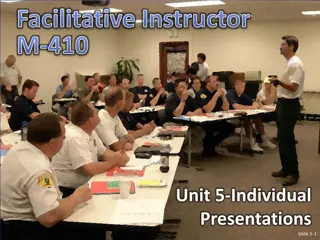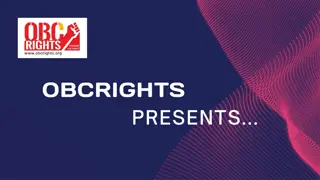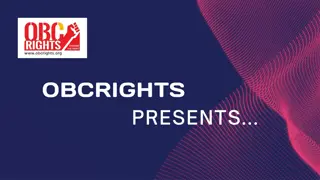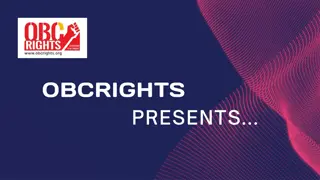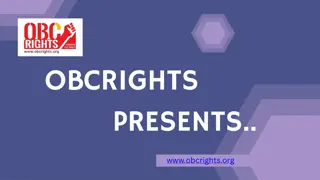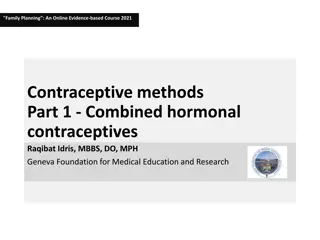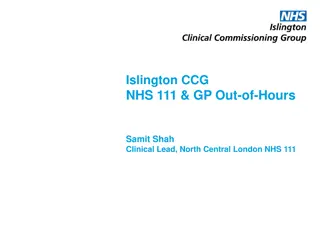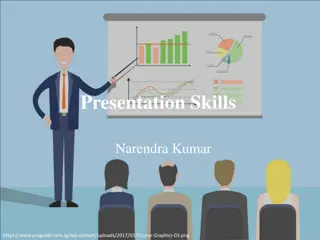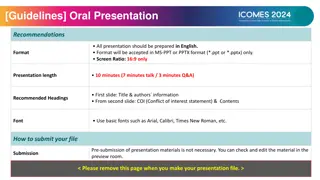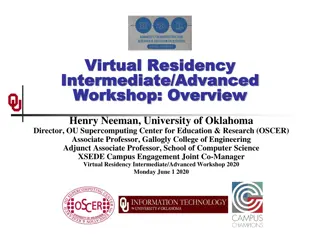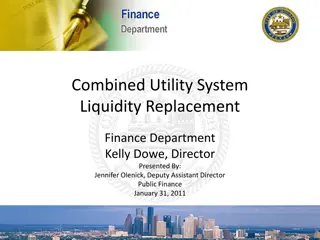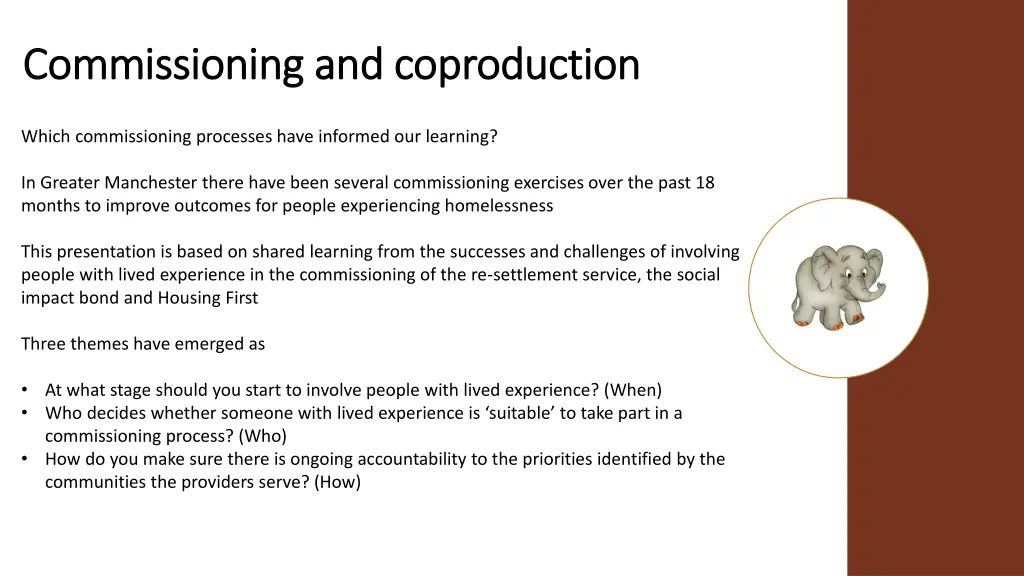
Involving Lived Experience in Commissioning and Coproduction
Learn about the key themes and strategies for involving people with lived experience in commissioning processes, shared learning from Greater Manchester's initiatives to improve outcomes for the homeless, and the importance of shared power and ongoing accountability in coproduction efforts.
Download Presentation

Please find below an Image/Link to download the presentation.
The content on the website is provided AS IS for your information and personal use only. It may not be sold, licensed, or shared on other websites without obtaining consent from the author. If you encounter any issues during the download, it is possible that the publisher has removed the file from their server.
You are allowed to download the files provided on this website for personal or commercial use, subject to the condition that they are used lawfully. All files are the property of their respective owners.
The content on the website is provided AS IS for your information and personal use only. It may not be sold, licensed, or shared on other websites without obtaining consent from the author.
E N D
Presentation Transcript
Commissioning and coproduction Commissioning and coproduction Which commissioning processes have informed our learning? In Greater Manchester there have been several commissioning exercises over the past 18 months to improve outcomes for people experiencing homelessness This presentation is based on shared learning from the successes and challenges of involving people with lived experience in the commissioning of the re-settlement service, the social impact bond and Housing First Three themes have emerged as At what stage should you start to involve people with lived experience? (When) Who decides whether someone with lived experience is suitable to take part in a commissioning process? (Who) How do you make sure there is ongoing accountability to the priorities identified by the communities the providers serve? (How)
Commissioning and coproduction Commissioning and coproduction Consultation without shifting power will lead to voice without influence (Gaventa, 2002) Co-producing commissioning means that commissioners need to use new methods or activities. It also means that they need to stop doing some familiar activities too, which is just as important (Think Local Act Personal) Are we looking to coproduce the commissioning process and the way commissioners/decision-makers work with local people to allocate resources? Will what we are doing genuinely shift any of the decision-making power? Or are we trying to commission services which can coproduce with local people in a more meaningful way? What ongoing accountability to local people and communities will the provider(s) have?
Commissioning and coproduction Commissioning and coproduction Theme 1: When to involve people with lived experience?
Sharing power in strategic planning Sharing power in strategic planning A chance to build informal relationships before formal processes take over More freedom and fluidity is possible before a tendering process has begun A chance to make peer research a really important part of priority setting and find out what matters most to local people Do we actually need to commission a service to be delivered by an established organisation? Is this the best way to empower communities A chance to explore assets rather than traditional needs assessments What do we know about people who ve faced similar challenges in the local area who ve gone on to live well?
Sharing power in strategic planning Sharing power in strategic planning Really get an understanding of the support people have received, and the social networks they have formed, which has helped people to live well Don t just do a focus group with the usual suspects where there is often little diversity What will other people in strategic roles need in order to view the community engagement and peer support as valid, credible evidence Think about what power you re willing to shift before the process starts. Have you already made the decision about how you are going to allocate resources? Its not fair to create an illusion you think local people will add value and have a meaningful role in the process if the reality is that they don t
Sharing power during procurement Sharing power during procurement By this stage it is important to already have a trusting relationship with local people. LA procurement processes will mean there are more restrictions at this stage You can use your creativity to flex the process a little The principles of coproduction can be used when live in tender but it becomes more difficult. The process and associated timelines start to take precedent over relationships Have a clear plan for how you can manage any associated risks (e.g. that the news of a tender award may get out before, the possibility that decisions made could be legally challenged) Have a clear understanding of where people with lived experience will add value. What is they understand better than those in traditional decision- maker roles
Theme 2: Who to involve? Theme 2: Who to involve? Some service users talk about a hierarchy of acceptable service users , with well educated, middle class people who could pass as normal at the top. At the bottom are service users with high and complex support needs Peter Beresford: Beyond the usual suspects (2013) There is also a tendency to not involve people who have had the worst experiences of engaging with public services and those who would like to see the most radical and fundamental changes. There are more issues than social class at play when deciding on whether someone is a suitable or acceptable service user/person with lived experience. Only working with those with more privileges will provide support for policies that consider ameliorating homelessness as best achieved by reforming individuals and focus solely on changing individual behaviour and risk Pleace (2018) People who fall outside of what many professionals deem to be acceptable service users tend to be excluded from decision-making processes. A challenge for involvement work is to offer the support and adaptions needed to enable individuals from a range of backgrounds to engage.
Theme 3: How to involve people Theme 3: How to involve people with lived experience? with lived experience? Many local people have become extremely disillusioned with witnessing organisations say whatever they need to say in order to win contracts and receive funding Bid-candy is a term used to describe vague window-dressing commitments to meet the priorities of local communities made by large organisations to enhance their bid credentials. Any non-binding commitments are often quietly ignored or squeezed out once the contract is in the bag. The most important measure of success is how easy or difficult was it for someone to get the type and level of support described in the bid The most important stages of the commissioning process are arguably pre and post the procurement process
Sharing your experiences Sharing your experiences What relationships do people have which allow for people with lived experience to participate in resource allocation meaningfully at every stage? What ideas to we have for making resource allocation and commissioning a more participatory project? What are the barriers you are experiencing to involving people with lived experience in commissioning in a meaningful way?
Tyrannies in participatory governance or what might we get wrong despite the best intentions?
Whats participatory governance? The ways in which citizens can take a more direct role in the decisions, processes and structures that affect them. Examples include: Participatory Budgeting Citizen s Assemblies and Citizen s Juries Co-produced decision making approaches Examples can be top down deliberative exercises, proposed by Government bodies, or bottom up initiatives led by communities or a mix of the two,
Why are we talking about participatory governance? We like it it s helping to revive democracy, improve decision making, strengthen legitimacy and help people feel that their voice matters . We see more and more examples across the world of cities and towns using these approaches. Public sector leaders, think tanks, and citizen-led groups see this way of working as the future.
TYRANNY? A way of thinking that develops in response to an identified issue, but which fails to live up to its original promise. Despite this, the way of thinking continues to hold sway. Each generation works in the shadows cast by the dominant ideas of the day, which are themselves responses to previous understandings. Solutions designed in response to problems because rigid and over-extended, turning into new problems to be solved. What makes the solutions tyrannical is that the space has not been created to fully acknowledge the limits of the idea. We can spot the signals that a tyranny might be present when we see sage nods of agreement in discussion in the room, but whispers of contradiction outside
THREE TYRANNIES 1. The quest for authenticity 2. Assumptions about leadership 3. Bottom up over top down
1. The quest for authenticity TYRANNY? Participatory governance engages citizens outside the ballot box, offering a way to more fully connect lived experience with decision making. The quality of representation rest not only on a democratic mandate but on the claim to authenticity . Participants, unlike elected representatives, become seen as the real thing . But non-elected representatives might represent narrow interest groups. Representatives who claim to represent wider groups might be prioritised. Authenticity might be used to devalue rather than acknowledge the contributions that can be made. Participants may feel pressured to justify their authenticity if there is an implied ordering , with some more authentic than others. There may be a relentless search for real people suggesting other people are less real or unreal . The usual suspects becomes used as a negative and suspicious term.
2. Assumptions about leadership TYRANNY? Participatory governance is assumed to align with distributed and shared leadership. Participatory processes value diverse voices being heard and collective expertise being pooled. But, leadership styles that value emergence, openness and distribution might hide underlying dynamics. Conflating adaptive leadership styles and participatory governance might conceal inequalities that arise due to power of participants, formal roles, or current and historical relationships. Adaptive leadership might overemphasis transparency, ensuring every voice is heard, and ensuring every participant is aware of and satisfied with the process. There will be trade offs, with the risk of an interminable process, seemingly an end in its own right, with a frustrating lack of focus on action .
3. Bottom up over top down TYRANNY? Both are generalised and Bottom up is best is contrasted to the perceived failure of top down governance. Can lead to a gap in understanding how to address wicked governance dilemmas. Existing governance forms are dismissed as part of the problem . Creates an unhelpful binary between professional, trained, technocratic elites and fetishizes an innovative, creative, experientially driven bottom-up . Ignores the risk of participation being captured by sectional interests.
Why might this matter? To avoid participatory governance from becoming a tainted policy fad To avoid participation used as a cloak of words to disguise business as usual: to hide power inequalities and enable elites to purse their own agendas SUGGESTIONS TYRANNY 1. To think about recruitment and to have a conversation about the value of lived experience in its own right, and to consider how to judge contributions on their own merits. TYRANNY 2. To not assume which models of leadership are most suited to the task in hand, and explicitly recognise the trade-offs. TYRANNY 3. To investigate top down or bottom up based on the outcomes that they produce; and to avoid essentialising either. CONCLUSIONS FINALLY Participation is not a cookbook Incompleteness is a virtue The ability of people to adapt and be self-aware and self-conscious is one of the conditions for democratic governance .





